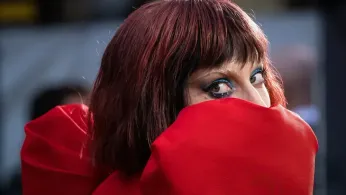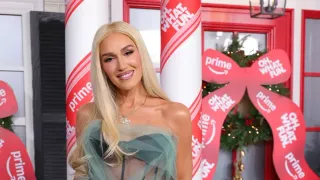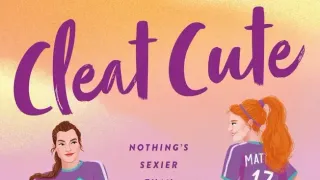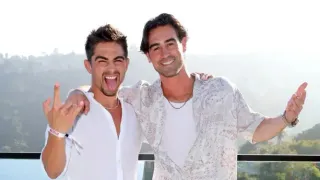
Nov 16
Born This Way, Not That Way: Lady Gaga, Family, and the Queer Art of Loving Through Disagreement
READ TIME: 3 MIN.
It’s a familiar scene for many in the LGBTQ+ community: the kitchen table debate, the awkward silences during holiday dinners, and the unspoken lines drawn between love and ideology. But when Lady Gaga—Mother Monster herself—admits it’s “hard” to square her fierce advocacy with her father’s unapologetic support for Donald Trump, she gives voice to a tension that’s raw, real, and intensely relatable for queer people everywhere .
Gaga, ever the open-hearted performer, didn’t sugarcoat the strain. “It’s hard,” she confessed, acknowledging the emotional labor involved in loving someone whose politics feel diametrically opposed to your own existence and values . For LGBTQ+ folks—many of whom have fought tooth and nail for acceptance in families that may not understand—her honesty lands like a balm and a battle cry.
Lady Gaga’s dad, Joe Germanotta, has never been shy about his politics, making headlines for his outspoken support of Trump-era conservatism . For many queer and trans people, the prospect of a family member actively supporting policies or politicians who threaten LGBTQ+ rights is more than a “difference of opinion”—it’s personal.
The emotional calculus gets even trickier when that family member is someone you love, someone who raised you, someone who represents both your roots and, in Gaga’s case, the platform from which you launched into global superstardom. Gaga’s willingness to speak openly about this contradiction is a rare, refreshing departure from the celebrity tendency to keep family drama behind closed doors.
Her words echo the stories of countless queer people who have had to navigate the fraught territory of family loyalty versus self-preservation. “It’s hard,” she repeats—a phrase that, in its simplicity, captures the exhaustion and heartbreak of loving across a political chasm.
For those of us who grew up idolizing Lady Gaga’s radical acceptance—her anthem “Born This Way” blaring at Pride marches and bedroom dance parties—her candor is a reminder that even our heroes are human. The idea of “chosen family” is foundational in queer culture, precisely because so many of us have felt that love and acceptance were conditional at home .
Gaga’s honesty about her family’s political divide doesn’t just humanize her—it normalizes the messiness of queer lives. She’s never claimed to have the perfect family, or the perfect answer. Instead, she models a kind of emotional resilience that’s all too familiar: you love fiercely, even when it hurts; you speak out, even when your voice shakes.
Her openness also challenges the culture of silence that often surrounds familial disagreement, especially when it comes to politics. In an era when “cancel culture” and social media call-outs reign supreme, Gaga’s approach is both radically honest and deeply compassionate.
It’s tempting to reduce stories like this to tabloid fodder—“Pop Star’s Dad Is a MAGA Guy!”—but to do so misses the deeper queer resonance. For many LGBTQ+ people, the stakes of political division at home are existential. Policies debated on TV become lived realities: access to healthcare, legal recognition, safety from discrimination. When the personal is political, every family argument can feel like a referendum on your worth.
Lady Gaga’s willingness to say, on the record, that it’s “hard” to love her Trump-supporting dad isn’t just celebrity gossip—it’s a mirror held up to our own struggles. It’s a reminder that being queer in a divided world often means holding contradictions in your heart: loving people who don’t—or can’t—fully love everything about you, and surviving anyway.
In her own words, Gaga has said, “The reason I didn’t answer the question was because I didn’t feel like a victim with that lie. But I thought about, like, what about a kid that’s being accused of that, that would think a public figure like me would feel shame” . Even when facing personal attacks or misinformation, she’s kept her eye on the bigger picture: using her platform to create space for those who feel unseen or unloved.
In the end, Lady Gaga’s struggle with her dad isn’t just a celebrity anecdote—it’s a microcosm of the queer experience in 2025. We live in a world where our rights are often up for debate, where love and acceptance can feel conditional, and where family ties are both lifeline and liability.
But Gaga’s frankness is its own kind of activism. By refusing to pretend her family is picture-perfect, she gives the rest of us permission to tell the truth about ours. By saying “it’s hard,” she validates the pain—and the perseverance—of every queer person who’s ever felt torn between loyalty and liberation.
So here’s to the messy families, the hard conversations, and the queer icons who remind us that honesty is not just brave—it’s beautiful. As Gaga herself might say: “We were born this way.” And sometimes, that means loving imperfectly, fiercely, and out loud, even when it gets hard.






